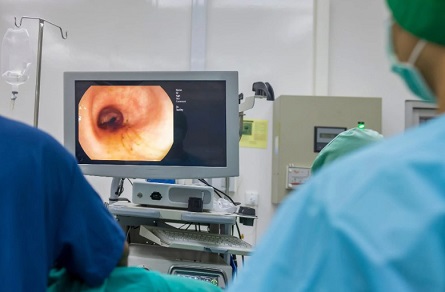AI In Medicine: Revolutionizing Colorectal Cancer Screening: The Impact Of AI-Assisted Colonoscopy On Adenoma Detection
Nikhil Prasad Fact checked by:Thailand Medical News Team Feb 27, 2024 1 year, 10 months, 8 hours, 53 minutes ago
AI In Medicine: Colorectal cancer is a significant public health concern, with colonoscopy serving as the gold standard for early detection and removal of precancerous polyps. Recent advancements in artificial intelligence (AI) have shown promising results in enhancing the accuracy of colonoscopy, particularly in detecting adenomas, the precursors to colorectal cancer. This
AI In Medicine news report explores the findings of a groundbreaking international, multicenter, randomized tandem trial that evaluated the effectiveness of a computer-aided polyp detection system in screening and surveillance colonoscopies.
 AI In Medicine: Revolutionizing Colorectal Cancer Screening:
AI In Medicine: Revolutionizing Colorectal Cancer Screening:
The Impact Of AI-Assisted Colonoscopy On Adenoma Detection
The Role of AI in Colonoscopy
Traditional colonoscopy involves visual examination by a gastroenterologist, relying on human attention and expertise. However, a study involving nearly 1,000 patients across ten hospitals in different countries revealed that when assisted by a smart computer, gastroenterologists detected nearly forty percent more polyps. The study, led by medical researcher Dr Michiel Maas from Radboud University Medical Center-Netherlands demonstrated that the computer's ability to analyze every pixel in the image and remain alert every millisecond significantly added value to the detection process.
Developed by Magentiq Eye LTD, the AI system was trained using thousands of photos and videos of colonoscopies from around the world. The system, known as MAGENTIQ-COLO, placed a purple square on suspicious areas in real-time, guiding the gastroenterologist's attention for closer examination. Despite the additional support from AI, the procedure did not prolong significantly, and false positives were not higher than standard examinations.
Key Findings of the Tandem Trial
The tandem trial conducted at Radboud University Medical Center in the Netherlands and other international sites included 916 patients undergoing colonoscopy for colorectal cancer screening or due to previous polyps. The patients were randomly assigned to receive either the standard colonoscopy or the AI-assisted examination. Additionally, a subset underwent tandem colonoscopies with both procedures.
The primary objectives of the trial were adenoma per colonoscopy (APC) and adenoma per extraction (APE). The study revealed a higher APC with AI-assisted colonoscopy compared to the standard procedure (0.70 vs. 0.51). This increase in adenoma detection did not compromise the non-inferiority of APE. Furthermore, the adenoma miss rate (AMR) in tandem colonoscopies was significantly reduced with the use of AI, showcasing a 47% relative decrease in missed adenomas.
Implications and Future Directions
The implications of the study are profound, indicating that AI-assisted colonoscopy has the potential to significantly enhance adenoma detection without increasing false positives or procedural time. Professor and Gastroenterologist Dr Peter Siersem
a emphasized the importance of future research to determine if AI can assess the danger level of a polyp based on visual characteristics and size. This could lead to a more targeted approach, leaving harmless polyps in place, reducing the need for pathology analysis, and ultimately decreasing complications and costs.
Comparison with Existing Evidence
A comprehensive review of existing evidence, including a meta-analysis conducted in 2023, highlights the consistent positive impact of AI on adenoma detection and miss rates. The study integrated data from 21 randomized controlled trials across different regions, reporting a significant increase in APC and a notable reduction in AMR with the use of CAD systems. However, the current tandem trial contributes uniquely to the literature by employing a parallel tandem design, supporting the hypothesis that AI can identify visually neglected adenomas.
Clinical Relevance and Future Considerations
The clinical relevance of the AI-assisted colonoscopy was evident in the increased detection of proximal lesions, particularly adenomas in the caecum and ascending colon, which are associated with a higher risk of colorectal cancer-related mortality. Additionally, the study highlighted an increased detection of both 6-9 mm and small adenomas, suggesting potential clinical relevance in identifying patients at higher risk for developing advanced adenomas.
Despite the promising results, the study acknowledges certain limitations, including an uneven distribution across study sites and a lack of long-term outcome data. Future research should focus on evaluating the cost-effectiveness and long-term impact of AI-assisted colonoscopy, including its potential to reduce the risk of post-colonoscopy colorectal cancer and overall mortality.
Conclusion
The integration of artificial intelligence into colonoscopy procedures represents a groundbreaking advancement in the field of colorectal cancer screening. The international, multicenter, randomized tandem trial showcased the significant benefits of AI-assisted colonoscopy, including increased adenoma detection and a substantial reduction in adenoma miss rates. As the field continues to evolve, further research and development are necessary to refine AI systems, assess long-term outcomes, and establish the cost-effectiveness of this transformative technology in enhancing colorectal cancer prevention and early detection.
The study findings from the tandem trial were published in the peer reviewed journal: The Lancet Digital Health.
https://www.thelancet.com/journals/landig/article/PIIS2589-7500(23)00242-X/fulltext
For the latest on
AI In Medicine, keep on logging to Thailand Medical News
